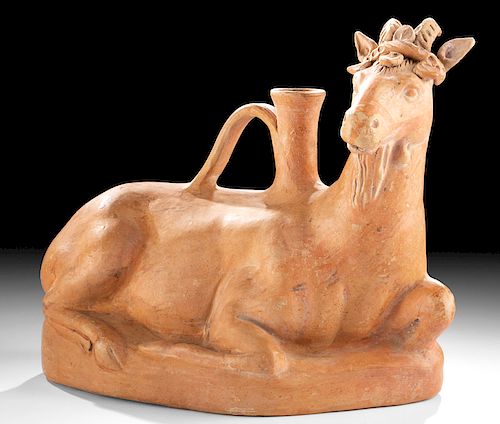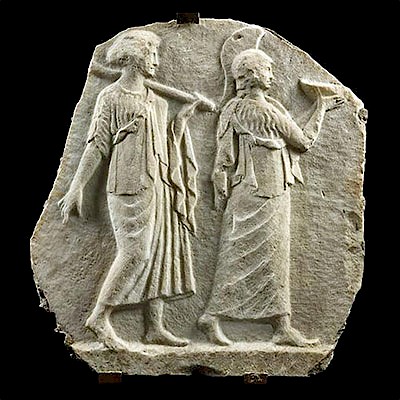Masterful Greek Hellenistic Terracotta Goat Vessel
Lot 32
About Seller
Artemis Fine Arts
686 S Taylor Ave, Ste 106
Louisville, CO 80027
United States
Selling antiquities, ancient and ethnographic art online since 1993, Artemis Gallery specializes in Classical Antiquities (Egyptian, Greek, Roman, Near Eastern), Asian, Pre-Columbian, African / Tribal / Oceanographic art. Our extensive inventory includes pottery, stone, metal, wood, glass and textil...Read more
Categories
Estimate:
$14,000 - $20,000
Absentee vs Live bid
Two ways to bid:
- Leave a max absentee bid and the platform will bid on your behalf up to your maximum bid during the live auction.
- Bid live during the auction and your bids will be submitted real-time to the auctioneer.
Bid Increments
| Price | Bid Increment |
|---|---|
| $0 | $25 |
| $300 | $50 |
| $1,000 | $100 |
| $2,000 | $250 |
| $5,000 | $500 |
| $10,000 | $1,000 |
| $20,000 | $2,500 |
| $50,000 | $5,000 |
| $100,000 | $10,000 |
| $200,000 | $20,000 |
About Auction
By Artemis Fine Arts
Feb 13, 2020
Set Reminder
2020-02-13 10:00:00
2020-02-13 10:00:00
America/New_York
Bidsquare
Bidsquare : Exceptional Antiquities, Asian, Ethnographic
https://www.bidsquare.com/auctions/artemis-gallery/exceptional-antiquities-asian-ethnographic-4848
An important one-day auction featuring museum-worthy examples of Egyptian, Greek, Roman, Etruscan, Near Eastern, Far East / Asian, Pre-Columbian, African / Tribal, Oceanic, Native American, Spanish Colonial, Russian, Fossils, Ancient Jewelry, Fine Art, so much more! Artemis Fine Arts info@artemisgallery.com
An important one-day auction featuring museum-worthy examples of Egyptian, Greek, Roman, Etruscan, Near Eastern, Far East / Asian, Pre-Columbian, African / Tribal, Oceanic, Native American, Spanish Colonial, Russian, Fossils, Ancient Jewelry, Fine Art, so much more! Artemis Fine Arts info@artemisgallery.com
- Lot Description
Greece, Hellenistic Period, ca. late 4th to early 1st century CE. A masterful ceramic vessel in the form of a goat seated atop a low, flat base. The goat is lifelike, its legs crouched underneath its body, which is portrayed with strong musculature on its haunches and powerful chest. A narrow strap handle and short spout that widens to a delicate mouth rises from the animal's shoulders. The head is a wonderful portrayal, with a long snout, calm, almond-shaped eyes, a magnificent beard, delicate pointed ears, and large, curved horns incised to give them a lifelike texture. A simple garland decorated with four leaves wraps around the animal's forehead. Remains of earthy red pigment give the impression of a bridle on the face, while the rest of the animal is painted the same pale orange as its base. Size: 8.6" W x 6.8" H (21.8 cm x 17.3 cm)
The garland around the head gives us a clue as to this goat's meaning. In the Greco-Roman world, goats were associated with the god Dionysus (Bacchus), god of wine and nature, and with the revels of the satyrs. At the massive Athenian festival of Dionysus, the second most important festival in the Greek calendar, actors performed tragedies and, from 487 BCE, comedies. The very first performance, in 534 BCE, was by the actor Thespis, who was awarded with a goat. Indeed, the word "tragedy" has "goat song" in its etymology - although whether this refers to a song whose singer would receive a goat for their performance or the mournful founds of actual goats is unclear. This vessel likely references the gift of the goat and the importance of Dionysus.
Provenance: private East Coast, USA collection; ex-Royal-Athena Galleries, New York, USA, acquired in the 2000s
All items legal to buy/sell under U.S. Statute covering cultural patrimony Code 2600, CHAPTER 14, and are guaranteed to be as described or your money back.
A Certificate of Authenticity will accompany all winning bids.
We ship worldwide and handle all shipping in-house for your convenience.
#152885Expertly repaired and restored; this is so well done as to be almost invisible. Notable areas are the back of the goat's body and the horns. The face is beautifully preserved with a high degree of detail. Nice deposits, especially on the underside.Condition
- Shipping Info
-
All shipping is handled in-house for your convenience. Your invoice from Artemis Gallery will include shipping calculation instructions. If in doubt, please inquire BEFORE bidding for estimated shipping costs for individual items.
-
- Buyer's Premium



 EUR
EUR CAD
CAD AUD
AUD GBP
GBP MXN
MXN HKD
HKD CNY
CNY MYR
MYR SEK
SEK SGD
SGD CHF
CHF THB
THB
















